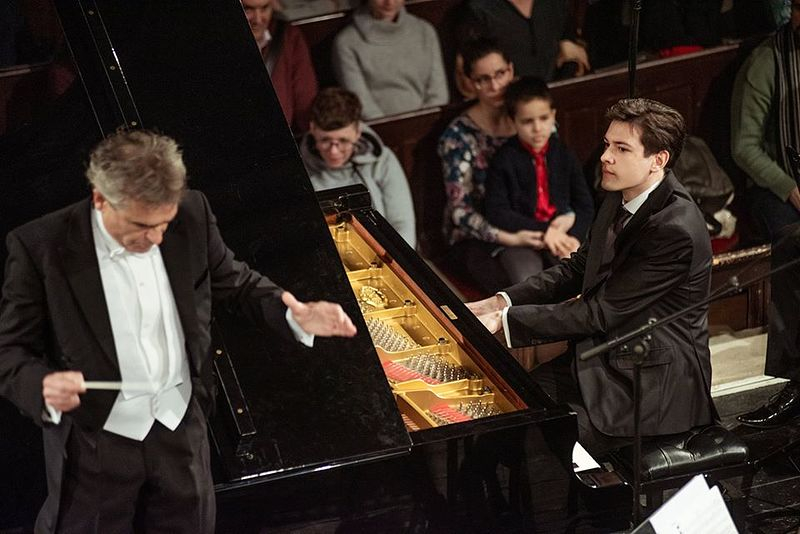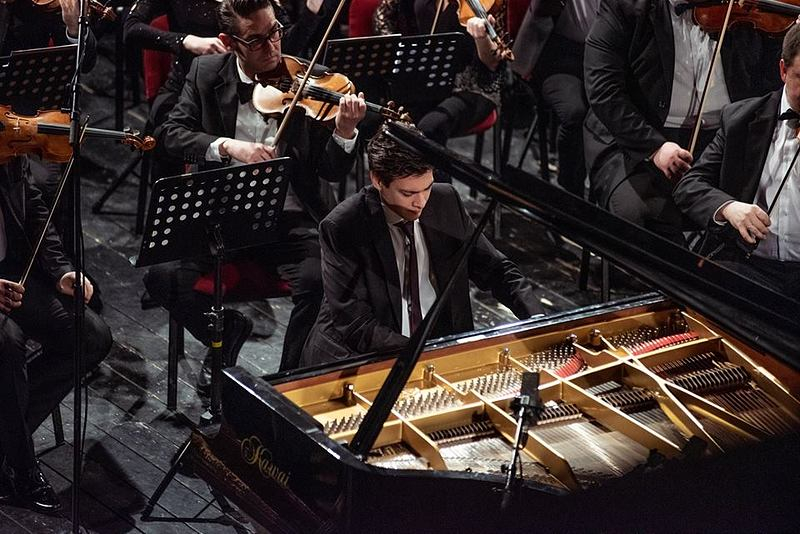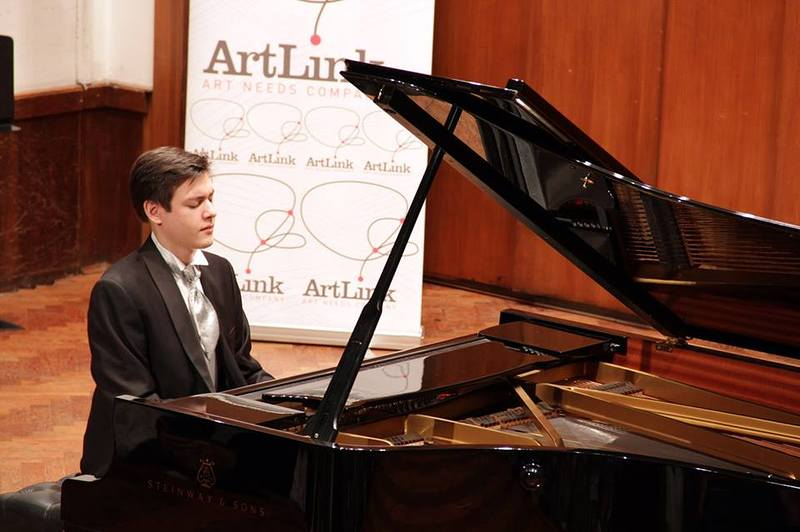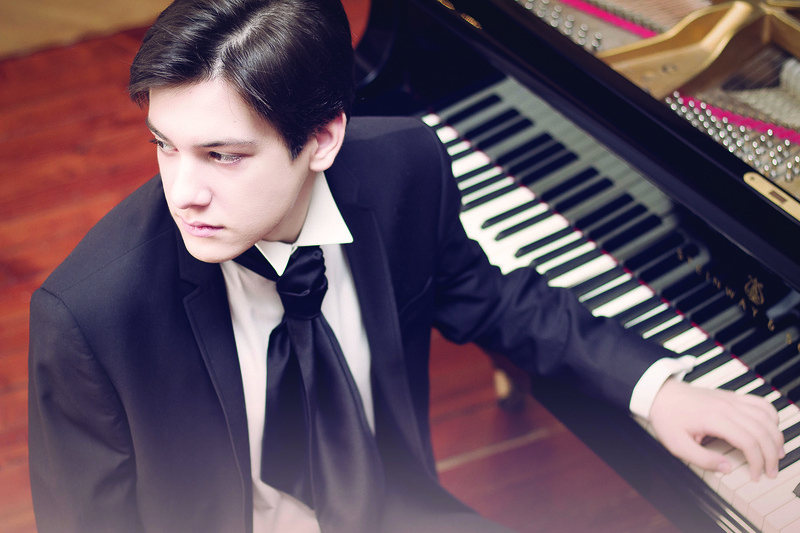
"
[...] It has begun. From Wednesday morning, one hundred and sixty-six pianists—according to festival materials—from all over the world started the eliminations for the 19th International Fryderyk Chopin Piano Competition. Thus, the Chamber Hall of the National Philharmonic has become the home of the Chopin marathon, which will last until May 4th.
Before the chronicle of the first day of competition—a few words on why it’s worth stopping by the Philharmonic. In bullet points, the strongest arguments:
Admission to every stage of the auditions costs 20 złoty, and after today, I can confirm—it’s doable because there are seats available.
Great concert hours—10:00 AM is a perfect time for truants. Imagine the faces of teachers and parents when the truancy comes to light, and—bam!—you pull out a Philharmonic ticket. I think you’ll get a conditional pardon.
A short break every half hour. Just enough to calmly enter and sit down or leave if you’ve had enough. Plus, two half-hour breaks: a morning one at 12:00 PM (so you can listen for two hours and then dash off for breakfast) and an evening one at 7:00 PM—perfect if you get bored and want to head into the city.
You can listen to pianists you’ll probably never hear again. After all, these are eliminations—roughly half of those performing here will be eliminated. And there are artists from countries that are musically exotic to us.
Have I convinced you? I hope so. The artistic spectrum in the eliminations is, understandably, broader than in the Competition itself, where only the pianists selected by the jury will perform. Will we see and hear the future winner of the 19th Competition in the eliminations? Hard to say, because the field will also include those who secured their spot without eliminations by winning other prestigious piano competitions worldwide. Personally—and honestly speaking—I’m deeply wondering whether "the winner is among us." But does it even matter now? You can soak in the atmosphere of the event, listen to often completely unexpected interpretations, and—on top of that—no one is judging anyone’s expertise, musical ear, or anything else. It’s pure, human pleasure. Sit down and simply lose yourself in the music, shutting out everyday concerns. Everyone can do it.
And now, the first controversy—a storm in a teacup. I’ll address it right away and close the topic on my blog. An artist performed whose nationality was listed as "under a neutral flag/Germany." And so it began. You all know that "neutral flag" means you-know-who. The debate: "Let this artist declare herself. Either she’s from you-know-where or from Germany." So I’ll answer briefly: This is a Chopin competition. Chopin himself was someone who, in his time, could just as well have performed as an "artist under a neutral flag/France." What does it matter? Talent and music are what count. If we let narratives of war and hatred into Chopin’s world, that world will be destroyed. Simple as that.
Now, about the day. Hmm. Until the last moment, I was searching for answers. Because, in my opinion, a lot has changed since the last Competition four years ago. I missed the romanticism on stage, the poetry hidden in Chopin’s notes. I heard performances that were technically better or worse—but not much different from one another. In the morning session, the only one who stood out to me as individualistic was David Khirkuli from Georgia. He played evenly, calmly, and beautifully. Exceptionally well-prepared, though perhaps a bit heavy-handed with the trusty Steinway. His playing reminded me of Yulianna Avdeeva, who, incidentally, is on this year’s jury. Khirkuli was the only one from the morning session who stayed in my mind. I wonder what lies ahead for this pianist.
The afternoon started much like the morning. Three Koreans played elegantly and correctly—but without fireworks. That changed with Japan’s Sakurako Kita. Like everyone else—this is just my opinion—she treated the first piece as a warm-up. But then she clearly gained confidence, and the Étude in A minor, Op. 25 No. 11 came out brilliantly, with excellently clear and audible left-hand work. The next pieces—Étude in A minor, Op. 25 No. 11 and Mazurka in B minor, Op. 24 No. 4—were, colloquially speaking, "catchy." Especially the mazurka, from which she drew out all its hidden romantic beauty. Antoni Kłeczek also shone with his mazurka (*Mazurka in C-sharp minor, Op. 50 No. 3*). He played it lightly, with flair and understanding.
And then the day was winding down. The last pianist of the first elimination round took the stage: Pavle Krstic, representing Bulgaria and Serbia. And it was pure pleasure. All day, I’d felt a lack of nocturnes. Many had been played earlier, yet their fairytale-like, dreamy beauty slipped away. Did it get lost under the weight of elimination pressure? Did these very young artists fail to capture it? Krstic began with the Nocturne in C minor, Op. 48 No. 1—and immediately sent a message: He has his own interpretive ideas, they’re well-considered, and he won’t hesitate to show them. Admittedly, for a moment, his nocturne teetered on the edge of a monumental-candyfloss confrontation—I wondered if I’d accidentally wandered into the idyllic land of Bedřich Smetana’s Má vlast. But it was just a fleeting thought. Krstic swiftly dispelled that doubt. In my opinion, it was the best-played nocturne of the day. The same went for the following pieces. Two dynamically performed études (C major, Op. 10 No. 1 and *A-flat major, Op. 10 No. 10*), where he flirted with the edge of bravura—but finally, this was something worth listening to! This was the Chopin I’d been waiting for all day. Then came a stunning Mazurka in B minor, Op. 33 No. 4. He uncovered everything in it—the folk-dance motifs, the longing-romantic threads. I was completely absorbed. He finished with a strong accent. The Scherzo in B minor, Op. 31 reached my ears for the third time that day—but only in Krstic’s performance did I truly hear it. He played it as if telling a story of the battle between good and evil, a dialogue between God and Satan. He executed this vision magnificently, and I hope I had the pleasure of applauding him not for the last time. Speaking of applause—Pavle Krstic was applauded for a long time. Much longer than the other pianists. But these are eliminations—no encores here.
And so that was the first day. You could say—the machinery of the 19th International Fryderyk Chopin Piano Competition is now in full swing. The coming days will be marked by elimination sessions, followed by the wait for October’s events. If you feel like taking part—nothing could be simpler. I’ve given you the arguments for, and you know the venue. Will I see you in the coming days? [...]
"
Original:
"Zaczęło się. Od środowego rana stu sześćdziesięciu sześciu pianistów - jak wynika z materiałów festiwalowych - z całego świata, rozpoczęło eliminacje do XIX Miedzynarodowego Konkursu Pianistycznego im. Fryderyka Chopina. Tym samym Sala Kameralna Filharmonii Narodowej stała się domem chopinowskiego maratonu, który potrwa aż do 4 maja.
Zanim kronika pierwszego dnia zmagań - kilka słów dlaczego warto do Filharmonii zajrzeć. W punktach, najmocniejsze argumenty:
Przekonałem Was? Mam nadzieję, że tak. Spektrum artystyczne jest w eliminacjach, co się rozumie samo przez się, większe niż w Konkursie, gdzie wystąpią już tylko wybrani przez Jury pianiści. Czy w eliminacjach zobaczymy i usłyszymy przyszłego zwycięzcę XIX Konkursu? Trudno powiedzieć, bo przecież w szranki staną także ci, którym przepustkę bez eliminacji zagwarantowały zwycięstwa w innych prestiżowych konkursach pianistycznych na świecie. Ja osobiście i uczciwie mówiąc - głęboko się zastanawiam, czy „zwycięzca jest wśród nas”. Ale jakie to ma teraz znaczenie? Można poczuć atmosferę tego wydarzenia. Posłuchać często zupełnie nieoczywistych interpretacji. A na dodatek - nikt przecież nikogo nie rozlicza z wiedzy fachowej, słuchu muzycznego i innych. To czysta, ludzka przyjemność. Usiąść i się po prostu zasłuchać, wyłączywszy sprawy codzienne. Każdy to umie i może.
Jest i pierwsza kontrowersja, czyli burza w szklance wody. Od razu opowiem i temat u siebie na blogu zamknę. Otóż wystąpiła Artystka, której przynależność państwową określono „pod flagą neutralną/Niemcy”. I się zaczęło. Wiecie przecież Państwo, że „flaga neutralna” oznacza samiwieciekogo. I dyskusja: Niech się określi ta Artystka. Albo jest samiwiecieskąd, albo z Niemiec. Zatem odpowiem krótko. To jest konkurs chopinowski. Chopin sam był kimś, kto równie dobrze mógłby we swoich czasach wystąpić jako „artysta pod flagą neutralną/Francja”. Jakie to ma znaczenie? Liczy się talent i muzyka. Jeśli do chopinowskiego świata wpuścimy narrację wojny i nienawiści, to ten świat zostanie zniszczony. Po prostu.
A teraz o dniu. Hmmm. Do ostatniej chwili szukałem odpowiedzi. Bo dużo się od ostatniego Konkursu, tego sprzed czterech lat, moim zdaniem, zmieniło. Brakowało mi na scenie romantyzmu, poezji jaka kryje się w chopinowskich nutach. Dostawałem raz po raz wykonania technicznie lepsze, albo gorsze. Ale niewiele się od siebie różniące. W porannej sesji na indywidualizm wybił się, mam wrażenie, tylko David Khirkuli z Gruzji. Grał równo, spokojnie i pięknie. Doskonale przygotowany, może trochę zbyt mocno traktował poczciwego Steinwaya. Przypominał mi sposobem grania Juliannę Avdeevą, która nota bene w tym roku zasiada w konkursowym jury. Z porannej sesji został mi w każdym razie w głowie tylko Khirkuli. Zastanawiam się, jakie będą dalsze losy tego pianisty. Popołudnie zaczęło się bardzo podobnie do poranka. Troje Koreańczyków grało elegancko i poprawnie. Ale bez fajerwerków. Zmieniła to Japonka Sakurako Kita. Jak wszyscy - to też moja opinia - potraktowała pierwszy grany utwór jako rozgrzewkę. Ale potem wyraźnie się ośmieliła i Etiuda a-moll op. 25 nr 11 wyszła świetnie, ze znakomicie czytelną i dobrze słyszalną lewą ręką. Kolejne - Etiuda a-moll op. 25 nr 11 i Mazurek b-moll op. 24 nr 4 - także, mówiąc językiem potocznym, „wpadające w ucho” Szczególnie mazurek, z którego udało się jej wydobyć całe ukryte tam romantyczne piękno. Błysnął również mazurkiem (Mazurek cis-moll op. 50 nr 3) Antoni Kłeczek. Lekko to zagrał, z polotem i zrozumieniem sprawy. I dzień chylił się ku końcowi. A wtedy na scenę wyszedł, jako ostatni pianista pierwszego dnia eliminacji, reprezentujący Bułgarię i Serbię, Pavle Krstic. I to była czysta przyjemność. Miałem przez cały dzień niedosyt nokturnów. Grano ich wcześniej sporo. A jednak ich baśniowo-senne piękno umykało. Ginęło pod ciężarem eliminacyjnej presji? Nie udawało się go odnaleźć tym bardzo przecież młodym Artystom? Krstic zaczął nokturnem c-moll op. 48 nr 1. I od razu przekazał wiadomość: On ma swoje propozycje interpretacyjne, są przemyślane i nie zawaha się ich nam pokazać. Fakt, na moment jego wykonanie nokturnu balansowało na krawędzi konfrontacji monumentalno-landrynkowej gdy pomyślałem sobie, czy nie znalazłem się omyłkowo w sielankowej krainie „Mojej Ojczyzny” Bedriha Smetany. Ale to był błysk, ledwie ulotna myśl. Krstic błyskawicznie rozwiał tę wątpliwości. To, moim zdaniem, był najlepiej zagrany nokturn tego dnia. Podobnie jak kolejne utwory. Dwie dynamicznie wykonane etiudy ( C-dur op. 10 nr 1 i As-dur op. 10 nr 10) w których dochodził z kolei do granicy brawury. Ale tego się wreszcie słuchało! To był Chopin, na jakiego cały dzień czekałem. A potem przepiękny mazurek h-moll op. 33 nr 4. Odczytał w nim wszystko. Wątki ludowo-taneczne, tęskno-romantyczne. Zasłuchałem się w tym wykonaniu. Skończył mocnym akcentem. Scherzo b-moll op. 31 zabrzmiało mi w uszach trzeci raz tego dnia. Ale dopiero w wykonaniu Krstica je usłyszałem. Zagrał tak, jakby opowiadał historię wojny dobra ze złem. Dialog Boga z Szatanem. Wspaniale mu się ten program udał i mam nadzieję, że miałem przyjemność oklaskiwać go nie po raz ostatni. Zresztą oklaskiwano Pavle Krstica długo. Znacznie dłużej, niż pozostałych pianistów. Jednak - to eliminacje. Tu bisów przecież nie ma.
Taki to był ten pierwszy dzień. Można powiedzieć - machina XIX Międzynarodowego Konkursu Pianistycznego im. Fryderyka Chopina ruszyła na dobre. Kolejne dni będą stały pod znakiem sesji eliminacyjnych. A potem czekania na wydarzenia październikowe. Kto ma chęć wziąć w tym udział - nic prostszego. Argumenty „za” podałem, miejsce Państwo znają. Widzimy się w najbliższych dniach?"
— Jacek Mroczek, TeatrVaria (April 23, 2025)
Go backSource Page




























This website uses only the basic Google Analytics Cookies to better understand the traffic on the Website. If you’d like to find out more about the cookies, please review our Privacy Policy. You must accept the Privacy Policy in order to use the website, however, you may choose to opt in or out of Google Analytics. Please note, that this information helps me to understand how my Website is being used and reached.